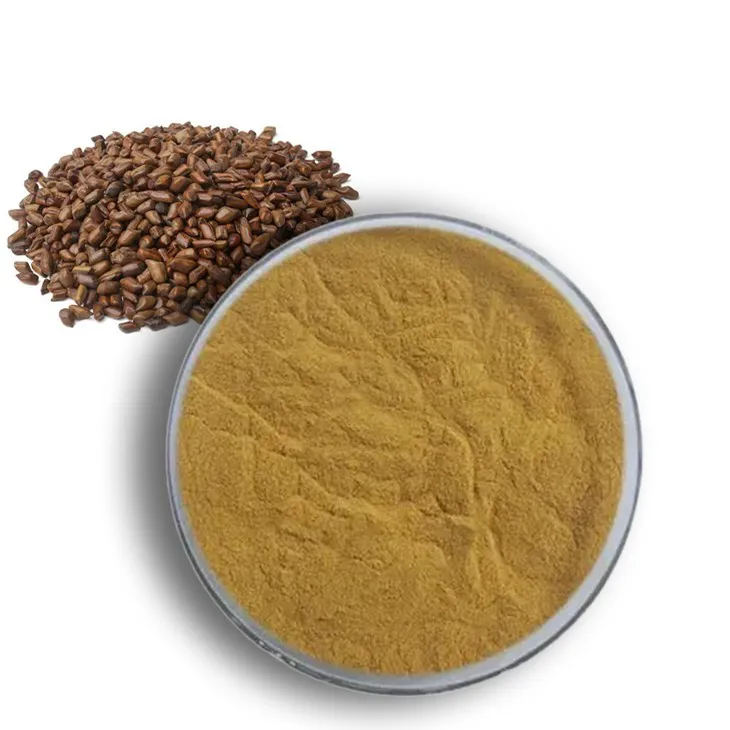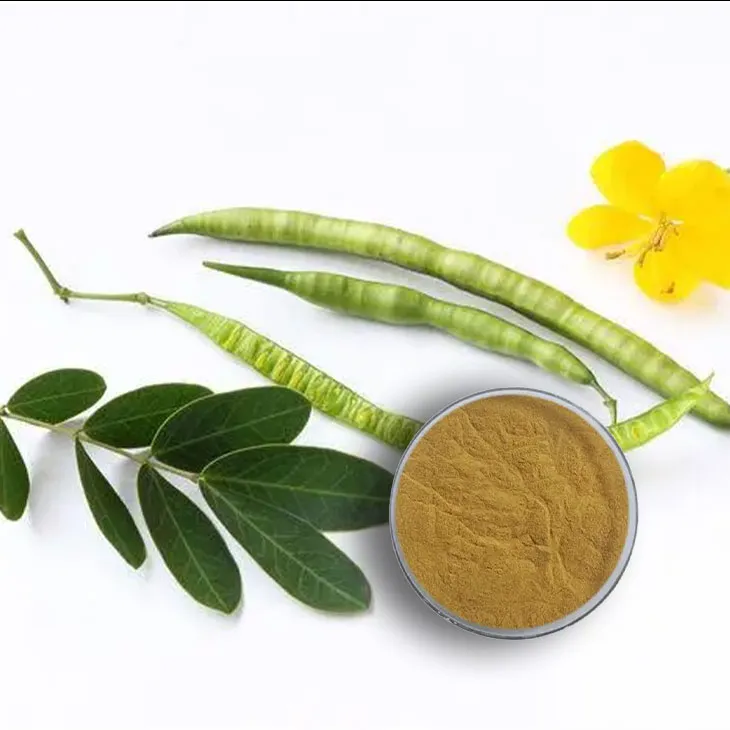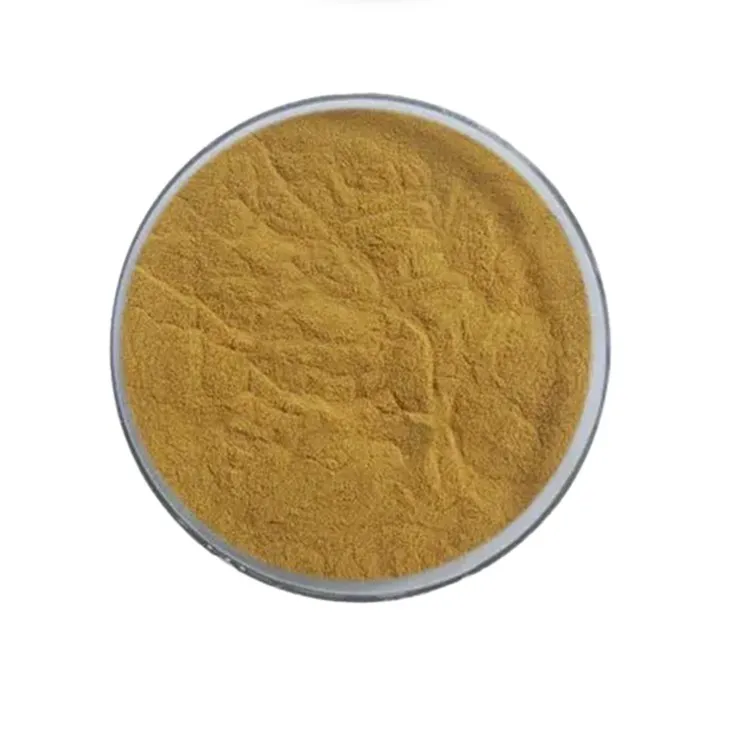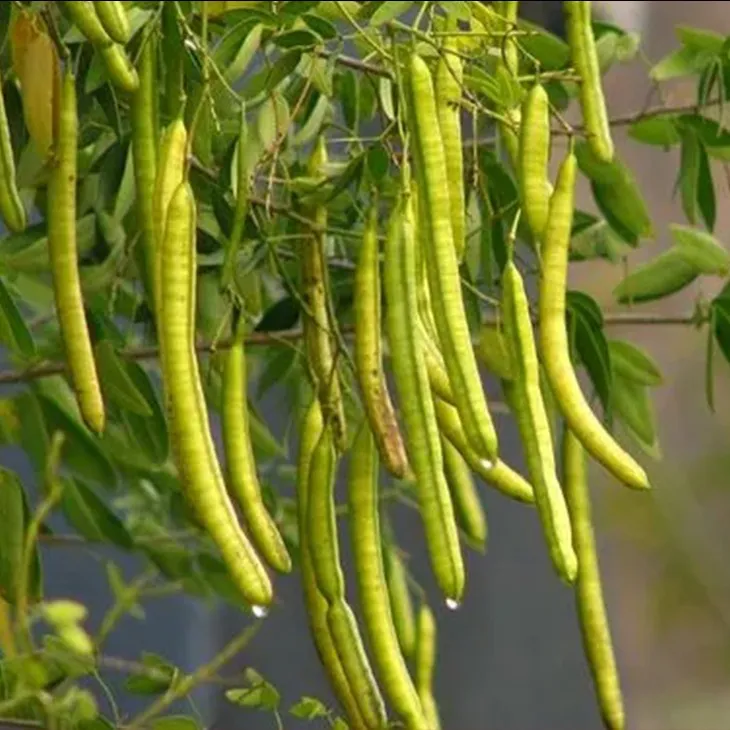- 0086-571-85302990
- sales@greenskybio.com
What is Cassia Seed Extract? Definition, Types, History and Nutritional Value.
2024-12-10

1. Definition of Cassia Seed Extract
Cassia Seed Extract is obtained from Cassia seeds through various extraction methods. Cassia seeds, scientifically known as Cassia obtusifolia or Cassia tora, are the raw materials for this extract. The extraction process aims to isolate and concentrate the bioactive components present in the seeds. These components can include a wide range of chemical substances such as flavonoids, anthraquinones, and phenolic acids. The resulting extract is a concentrated form of the beneficial elements found in Cassia seeds, which can be used for different purposes, including in traditional medicine, cosmetics, and potentially in the development of new drugs.

2. Types of Cassia Seed Extract
2.1 Based on Chemical Composition
- Flavonoid - rich extract: Flavonoids are one of the major groups of bioactive compounds in Cassia seeds. The flavonoid - rich extract may contain substances like rutin, Quercetin, and kaempferol derivatives. These flavonoids are known for their antioxidant properties, which can help protect the body's cells from oxidative damage caused by free radicals. For example, rutin has been shown to have anti - inflammatory effects and can improve blood vessel function.
- Anthraquinone - containing extract: Anthraquinones are another important class of compounds in Cassia seeds. This type of extract may include compounds such as emodin and rhein. Anthraquinones are often associated with laxative effects, which is one of the traditional uses of Cassia seeds. However, they also have other potential biological activities, such as antimicrobial and anticancer properties, although more research is needed in these areas.
- Phenolic acid - based extract: Phenolic acids like caffeic acid and chlorogenic acid can be concentrated in a specific type of Cassia seed extract. These phenolic acids have antioxidant, anti - inflammatory, and potential neuroprotective effects. They may contribute to the overall health - promoting properties of the Cassia seed extract.
2.2 Based on Extraction Methods
- Solvent - extracted Cassia seed extract: Different solvents can be used to extract Cassia seed extract, such as ethanol, methanol, or water. Ethanol - extracted Cassia seed extract is common because ethanol can effectively dissolve many of the bioactive compounds in the seeds. The choice of solvent can influence the composition and properties of the final extract. For example, water - extracted Cassia seed extract may have a different profile of bioactive compounds compared to ethanol - extracted ones, as some compounds are more soluble in ethanol while others are more soluble in water.
- Supercritical fluid - extracted Cassia seed extract: Supercritical fluid extraction, often using carbon dioxide as the supercritical fluid, is a more advanced extraction method. This method has the advantage of being able to extract compounds under milder conditions compared to traditional solvent extraction. It can also produce a purer extract with fewer impurities. Supercritical fluid - extracted Cassia seed extract may have higher quality and better preservation of the bioactive compounds, making it potentially more suitable for certain high - end applications, such as in the pharmaceutical industry.

3. History of Cassia Seed in Medicine
3.1 Ancient Use
Cassia seeds have a long history in traditional medicine systems. In ancient Chinese medicine, Cassia seeds were used for various health conditions. They were often prescribed for eye problems, as it was believed that they could nourish the eyes and improve vision. For example, in traditional Chinese ophthalmology, Cassia seed decoctions were used to treat symptoms such as blurry vision, eye dryness, and redness. The use of Cassia seeds can be traced back to some of the earliest medical texts in China, where they were documented for their medicinal properties.
3.2 Traditional Medicinal Practices in Different Cultures
- In Chinese Medicine: Besides eye problems, Cassia seeds were also used for their laxative effects in Chinese medicine. They were considered to be able to regulate the digestive system and relieve constipation. In addition, they were sometimes used in formulas to treat hypertension and hyperlipidemia, as some traditional Chinese medicine theories suggest that they can help regulate the body's qi and blood circulation, and reduce the "internal heat" which is associated with these conditions.
- In Ayurvedic Medicine (India): There are also records of Cassia seeds being used in Ayurvedic medicine. Although the applications may not be exactly the same as in Chinese medicine, they were also recognized for their potential to improve digestion and relieve certain body discomforts. Ayurvedic practitioners may have used Cassia seeds in different herbal formulations based on their understanding of the body's doshas (vata, pitta, and kapha) and the need to balance them.
3.3 Modern Research and Development
In modern times, scientific research on Cassia seeds and their extract has increased significantly. Researchers have been using modern analytical techniques to study the chemical composition of Cassia seed extract. This has led to a better understanding of the bioactive compounds present in the extract and their potential mechanisms of action. For example, studies on the antioxidant properties of Cassia seed extract have explored how the flavonoids and phenolic acids in the extract can scavenge free radicals and protect cells. Moreover, research on the potential application of Cassia seed extract in treating metabolic disorders such as diabetes and obesity is also underway. Scientists are trying to uncover whether the compounds in the extract can regulate glucose and lipid metabolism through various signaling pathways in the body.

4. Nutritional Value of Cassia Seed Extract
4.1 Immune - enhancing Properties
The components in Cassia seed extract, such as flavonoids, may play a role in enhancing the body's immune system. Flavonoids can modulate the immune response by interacting with immune cells. For example, they can enhance the activity of macrophages, which are cells that play a crucial role in the body's defense against pathogens. By strengthening the immune system, Cassia seed extract may help the body to better resist infections and diseases.
4.2 Impact on Blood Circulation
- Anticoagulant and Anti - platelet Effects: Some compounds in Cassia seed extract may have anticoagulant and anti - platelet effects. This means that they can prevent blood from clotting too easily. For example, anthraquinones may inhibit platelet aggregation, which is an important step in the formation of blood clots. By reducing the risk of abnormal blood clotting, Cassia seed extract may be beneficial for maintaining healthy blood circulation, especially in preventing conditions such as thrombosis.
- Vasodilatory Action: Cassia seed extract may also have a vasodilatory effect. Flavonoids and other bioactive compounds can relax the smooth muscle cells in blood vessels, causing the blood vessels to dilate. This can lead to improved blood flow, which is important for delivering oxygen and nutrients to different parts of the body. It can also help in reducing blood pressure, as wider blood vessels mean less resistance to blood flow.
4.3 Eye - nourishing Benefits
Cassia seed extract has long been associated with eye - nourishing properties. In traditional medicine, it was used to treat various eye problems. Modern research has suggested that some of the components in the extract, such as flavonoids and vitamins, may contribute to eye health. For example, flavonoids can protect the eyes from oxidative stress, which is one of the factors contributing to age - related macular degeneration and cataracts. Additionally, Cassia seed extract may have a role in improving eye - related microcirculation, which is essential for maintaining the normal function of the eyes.

FAQ:
What are the main chemical components in Cassia seed extract?
Cassia seed extract contains a complex mixture of chemical components. Some of the main ones may include flavonoids, which are known for their antioxidant properties. There are also other compounds that contribute to its medicinal effects, but a comprehensive list and detailed understanding are still the subject of ongoing research.
How has Cassia seed extract been used in traditional medicine?
In traditional medicine, Cassia seed extract has been used in various ways. It has been used for treating eye problems, as it was believed to have a nourishing effect on the eyes. It was also used for improving blood circulation. Additionally, it might have been used in formulations to boost the body's overall health and potentially enhance immunity.
Can Cassia seed extract really enhance immunity?
There are some indications that Cassia seed extract may enhance immunity. It contains certain elements that could potentially stimulate the body's immune system. However, more research is needed to fully understand the mechanisms and the extent of its impact on immunity. At present, it is considered as having potential in this regard based on some initial studies and its long - standing use in traditional medicine.
Is Cassia seed extract safe for everyone to use?
While Cassia seed extract has been used in traditional medicine, it may not be safe for everyone. Some people may be allergic to it. Also, if not used properly, it could cause side effects. For example, excessive use might lead to adverse effects on the digestive system. Pregnant women and those with certain medical conditions should be especially cautious and consult a healthcare professional before using Cassia seed extract.
How is Cassia seed extract prepared?
The preparation of Cassia seed extract typically involves several steps. First, the Cassia seeds are collected and cleaned. Then, they can be processed through methods such as solvent extraction. Different solvents may be used to extract different components. After extraction, the extract may be further purified and concentrated to obtain the final Cassia seed extract product. However, the exact process may vary depending on the intended use and the requirements of quality control.
Related literature
- The Chemical Constituents and Pharmacological Effects of Cassia Seed Extract"
- "Traditional Uses and Modern Research of Cassia Seeds"
- "Nutritional and Medicinal Value of Cassia Seed Extract: A Comprehensive Review"
- ▶ Hesperidin
- ▶ Citrus Bioflavonoids
- ▶ Plant Extract
- ▶ lycopene
- ▶ Diosmin
- ▶ Grape seed extract
- ▶ Sea buckthorn Juice Powder
- ▶ Fruit Juice Powder
- ▶ Hops Extract
- ▶ Artichoke Extract
- ▶ Mushroom extract
- ▶ Astaxanthin
- ▶ Green Tea Extract
- ▶ Curcumin
- ▶ Horse Chestnut Extract
- ▶ Other Product
- ▶ Boswellia Serrata Extract
- ▶ Resveratrol
- ▶ Marigold Extract
- ▶ Grape Leaf Extract
- ▶ New Product
- ▶ Aminolevulinic acid
- ▶ Cranberry Extract
- ▶ Red Yeast Rice
- ▶ Red Wine Extract
-
Sophora Flavescens Root Extract
2024-12-10
-
Medicinal Marshmallow Extract
2024-12-10
-
Giant Knotweed Extract
2024-12-10
-
Lemon Extract
2024-12-10
-
Elderberry Extract
2024-12-10
-
Milk Thistle Extract
2024-12-10
-
Citrus Aurantii Extract
2024-12-10
-
Chia Seed Powder
2024-12-10
-
Pine bark Extract Powder
2024-12-10
-
Citrus Aurantium Extract
2024-12-10





















